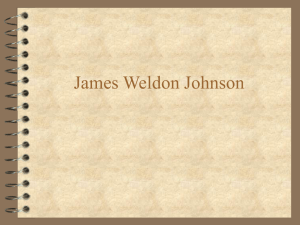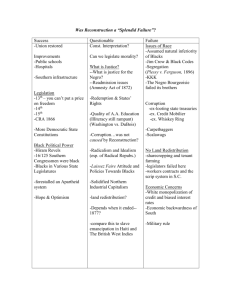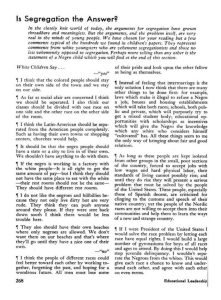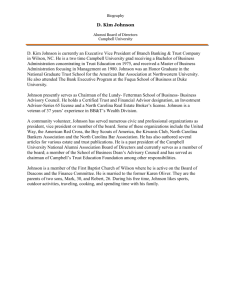Court Cases of the Johnson Family Court Cases of the Johnson Family
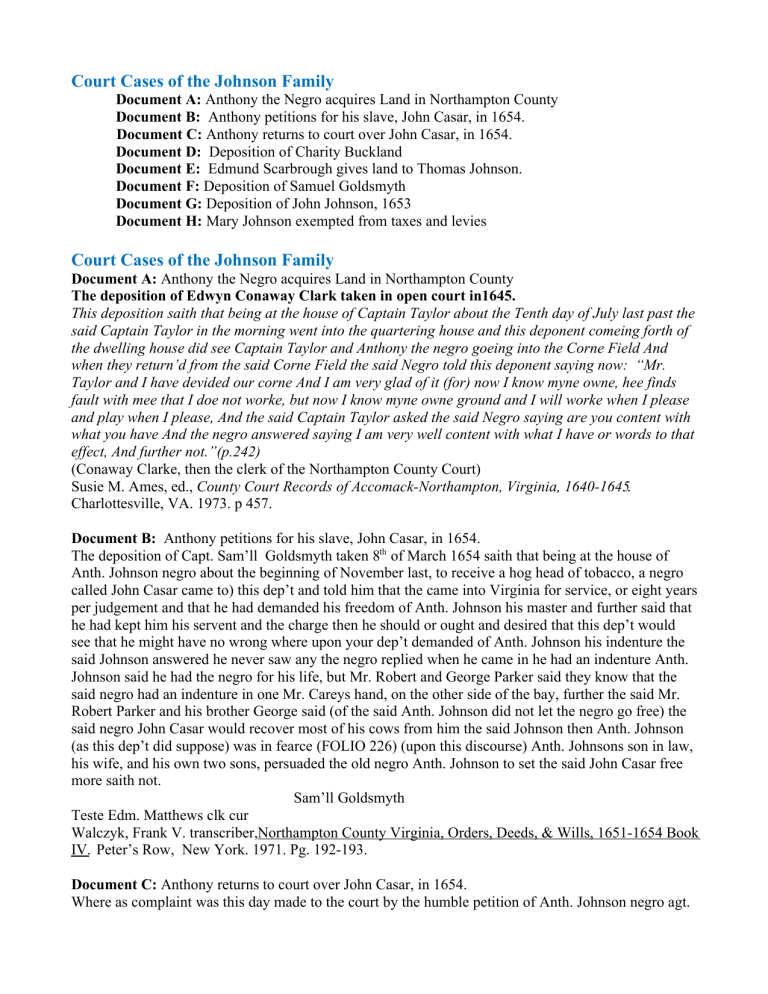
Court Cases of the Johnson Family
Document A: Anthony the Negro acquires Land in Northampton County
Document B: Anthony petitions for his slave, John Casar, in 1654.
Document C: Anthony returns to court over John Casar, in 1654.
Document D: Deposition of Charity Buckland
Document E: Edmund Scarbrough gives land to Thomas Johnson.
Document F: Deposition of Samuel Goldsmyth
Document G: Deposition of John Johnson, 1653
Document H: Mary Johnson exempted from taxes and levies
Court Cases of the Johnson Family
Document A: Anthony the Negro acquires Land in Northampton County
The deposition of Edwyn Conaway Clark taken in open court in1645.
This deposition saith that being at the house of Captain Taylor about the Tenth day of July last past the said Captain Taylor in the morning went into the quartering house and this deponent comeing forth of the dwelling house did see Captain Taylor and Anthony the negro goeing into the Corne Field And when they return’d from the said Corne Field the said Negro told this deponent saying now: “Mr.
Taylor and I have devided our corne And I am very glad of it (for) now I know myne owne, hee finds fault with mee that I doe not worke, but now I know myne owne ground and I will worke when I please and play when I please, And the said Captain Taylor asked the said Negro saying are you content with what you have And the negro answered saying I am very well content with what I have or words to that effect, And further not.”(p.242)
(Conaway Clarke, then the clerk of the Northampton County Court)
Susie M. Ames, ed., County Court Records of Accomack-Northampton, Virginia, 1640-1645 .
Charlottesville, VA. 1973. p 457.
Document B: Anthony petitions for his slave, John Casar, in 1654.
The deposition of Capt. Sam’ll Goldsmyth taken 8 th of March 1654 saith that being at the house of
Anth. Johnson negro about the beginning of November last, to receive a hog head of tobacco, a negro called John Casar came to) this dep’t and told him that the came into Virginia for service, or eight years per judgement and that he had demanded his freedom of Anth. Johnson his master and further said that he had kept him his servent and the charge then he should or ought and desired that this dep’t would see that he might have no wrong where upon your dep’t demanded of Anth. Johnson his indenture the said Johnson answered he never saw any the negro replied when he came in he had an indenture Anth.
Johnson said he had the negro for his life, but Mr. Robert and George Parker said they know that the said negro had an indenture in one Mr. Careys hand, on the other side of the bay, further the said Mr.
Robert Parker and his brother George said (of the said Anth. Johnson did not let the negro go free) the said negro John Casar would recover most of his cows from him the said Johnson then Anth. Johnson
(as this dep’t did suppose) was in fearce (FOLIO 226) (upon this discourse) Anth. Johnsons son in law, his wife, and his own two sons, persuaded the old negro Anth. Johnson to set the said John Casar free more saith not.
Sam’ll Goldsmyth
Teste Edm. Matthews clk cur
Walczyk, Frank V. transcriber, Northampton County Virginia, Orders, Deeds, & Wills, 1651-1654 Book
IV. Peter’s Row, New York. 1971. Pg. 192-193.
Document C: Anthony returns to court over John Casar, in 1654.
Where as complaint was this day made to the court by the humble petition of Anth. Johnson negro agt.
Mr. Robert Parker that he detaineth one John Casar a negro the plaintiff servent (under pretense that the said John Casar is a freeman) the court seriously considering and maturely weighing the principles do find that the said Mr. Robert Parker most instly. Keepeth the said negro (John Casar) from his said master Anth. Johnson, as appeareath by the deposition of Capt. Sam’ll Goldsmyth and many probable circumstances. Its therefore the judgement of the court and ordered that the said John Casar negro shall forthwith be returned into the service of his said master Anthony Johnson and that the said Robert
Parker make payment of all charge in the suit atr exec.
Walczyk, Frank V. transcriber, Northampton County Virginia, Orders, Deeds, & Wills, 1651-1654 Book
IV. Peter’s Row, New York. 1971. Pg.193.
Document D: Deposition of Charity Buckland
Deposition of Charity Buckland, aged 35 years, 16 December 1663. Said that she and John Rogers were at the house of Antony Johnson, Negro, and she demanded to know if the cow he reported belonging to her children was there or not. He said it was not, for it was Mr. Hack’s. Buckland asked if it was Mr. Hack’s mark, and he said it was Abram Morgin’s mark.
Signed, Charity (Ch) Buckland
Walczyk, Frank V. transcriber, Northampton County Virginia, Orders, Deeds, & Wills, 1651-1654 Book
IV. Peter’s Row, New York. 1971. Pg.61.
Earlier-Deposition in Court on October 28 th , 1663
The difference depen’t between Lt. Thomas Hunt and Anthony Johnson negro (concerning a cow) is referred to the examination and final defamation of Capt. Sam’ll Goldsymth and Mr. Robert Parker.
Walczyk, Frank V. transcriber, Northampton County Virginia, Orders, Deeds, & Wills, 1651-1654 Book
IV. Peter’s Row, New York. 1971. Pg.175.
Document E: Edmund Scarbrough gives land to Thomas Johnson.
A Certifficate graunted unto Edmund Scarbrough. Richard Price, John Jackman, Edward Cuttings,
William Williamson.
I Edmund Scarbrough doe by these presents the Certifficate and the Land due thereby unto Mr. Thomas
Johnson his heyres or Assignes witness my hand this 28 th of December.
Edmund Scarbrough
A Certifficate granted unto Thomas Johnson.
James Gutts, Thomas Johnson, per Certifficate 200, Mary Johnson, Mary Wilson, Mary Mylls, John
Jenkins, William Coart, William Quick.
Document F: Deposition of Samuel Goldsmyth
From John H. Russell. Colored Freemen as Slaveowners in Virginia. Journal of Negro History. Vol. 1, no. 3. (1916): 234-235.
The deposition of Capt. Samll. Goldsmyth taken in open court 8th of March [16]54 sayeth that being att ye house of Anth. Johnson Negro about ye beginning of November last to receive a Hogsd of tobac, a negro called Jno. Casor came to this depo [nen]t & told him yt hee came into Virginia for seaven or eight years of Indenture; yt hee had demanded his freedome of Antho. Johnson his mayster & further sd yt hee had kept him his serv[ant] seaven years longer than hee should or ought; and desired that this
Deponent would see yt hee should or ought; and desired that this Deponent would see yt hee might have noe wronge; whereupon your deponent demanded of Anth. Johnson his Indenture. the sd Johnson answered hee never saw any. The negro Jno. Casor replyed when hee came in he had an Indenture.
Anth. Johnson sd hee had ye Negro fro his life, but Mr. Robert & George Parker sd they knewe that ye sd Negro had an Indenture in one Mr. S hand on ye other side of ye Baye. Further sd Mr. Robert Parker
& his Brother George sd (if the sd. Anth. Johnson did not let ye negro go free) the said negro Jno Casor
would recover most of his Cows from him ye sd Johnson. Then Anth. Johnson (as this dep’t. did suppose) was in a great feare…Anth. Johnsons sonne in Law, his wife & his own two sonnes persuaded the old negro Anth. Johnson to sett the sd. Jno. Casor free…more sth not. Samll Goldsmyth.
Eight March Anno 1654.
Whereas complaint was this daye made to ye court by ye humble peticion of Anth. Johnson Negro ag[ains]t Mr. Robert Parker that hee detayneth one John Casor a Negro the plaintiffs Serv[an]t under pretense yt the sd Jno. Casor a Negro is a freeman the court seriously considering & maturely weighing ye premises doe fynd that ye sd Mr. Reboert Parker most unrightly keepeth ye sd Negro John
Casor from his r[igh]t of mayster Anth. Johnson as it appeareth by ye Deposition of Capt. Samll Gold smith & many probable circumstances. be it therefore ye Judgement of ye court & ordered that ye sd
Jno. Casor negro, shall forthwith bee turned into ye service of his sd master Anthony Johnson and that the sd Mr. Robert Parker make payment of all charges in the suite and execution .
Document G: Deposition of John Johnson, 1653
For as much as John Johnson negro, the son of Anth. Johnson negro, hath this day made his complaint to the court that John Johnson Senior most instly distaineth a patent of his for 450 acres of land (which patent the said John Johnson negro claimeth and probable the affirmeth to be for his land) its therefore ordered that the said John Johnson Senior shall make his appearance at the next court held in this county. At the house of Walter Willyams, upon 28 of February to answer the suit of the said John
Johnson negro, and (if it shall be proved that the said John Johnson Senior hath wrongfully detained the negro his said patent, that then he shall pay damages ( as the court shall think fit and in cause, with all costs and charges in the suit. At exec.
Recorded novo die September 1653 per Edm. Mathews clk cur
Walczyk, Frank V. transcriber, Northampton County Virginia, Orders, Deeds, & Wills, 1651-1654 Book
IV. Peter’s Row, New York. 1971. Pg.171.
Document H: Mary Johnson exempted from taxes and levies
Upon the pet. of Anth. Johnson negro and Mary his wife, and their information to the court that they have been inhabitants in Virginia (about thirty years) consideration being taken of their hard labor and known service performed by the petitioners in this country, for the obtaining of their livelyhood and the great losses they have sustained (by an unfortunate fire) with their present charge to provide for, its therefore thought fit and ordered that from the day of the date there of (during their natural lives) the said Mary Johnson and two daughters of Anth. Johnson negro be disengaged and freed from payment of taxes and levies in Northampton County for public uses.
Walczyk, Frank V. transcriber, Northampton County Virginia, Orders, Deeds, & Wills, 1651-1654 Book
IV. Peter’s Row, New York. 1971. Pg.137.
Document B- Margaret Washington
Who are the early Africans who come to America?
We're not really sure where these early Africans came from. They were on mostly Dutch ships, some
Portuguese ships, so they probably were from the central part of West Africa. That would mean that they were Congolese or from the Angolan region. And in the process of going from Africa, they probably stopped at the Caribbean, and from there, came to Virginia. They probably were individuals who had been exposed to several cultures before they got to Virginia. And that was another exposure.
They probably had not heard English in the early years, and may have spoken Portuguese, and may have spoken French, may have spoken Spanish. And once again, had to adjust to another language.
One of the early Africans coming to Virginia, Antonio, who was later called Anthony Johnson, gives us a sense of this. His name was initially recorded as Antonio. So we know that he was probably given that name either by Spanish or Portuguese people. That's one possibility. The other possibility is that
Antonio was from the Congo and may have been baptized, even by a Congolese priest, which they did on the coast of the Congo, who gave him that Latinized name. So there are various ways in which the early African Virginians arrived in the British mainland.
Margaret Washington
Associate Professor of History
Cornell University
Document G- Ira Berlin
Why did Anthony and Mary go the Eastern Shore?
Historian Ira Berlin argues that Johnson was a favorite of Bennett's and Bennett allowed Johnson to farm for himself, marry and baptize his children because he was a strong, healthy, favorable worker. In short, Bennett liked Johnson and wanted to help him. Berlin says that Johnson followed Bennett to the
Eastern Shore of Virginia where, "like other men of substance, Johnson and his sons farmed independently, held slaves and left their sons sizable estates." In any case, whether the Johnsons went to the Eastern Shore by themselves or followed their benefactor Bennett, Anthony and Mary became respected members of the community there, enjoyed rights along with other free people and frequently employed the law to protect themselves and advance their interests.
Dr. Ira Berlin
University of Virginia
Document I- Joseph Collins
How do we know that Anthony came to Jamestown on the San Juan Bautista ?
The Two Ships that Got Away: An Update on the Jamestown Colony Story by Joseph Collins 2007
( In 1607, Jamestown became the 1 st permanent English settlement in the Americas. For centuries, very little was known about the origins of a group of Africans that landed there in 1619. In fact, the reliance by historians on a few surviving letters and journals written by colonists led to published conclusions that we now know are false. Here is the true story about two ships whose role escaped the eyes of history and what we now know about a group of slaves brought to the shores of Virginia .)
The summer of 1619 was a high time in the Chesapeake Bay colony. Several years prior, John Rolfe literally saved an infant nation from starvation and failure by importing tobacco seeds from Trinidad and Venezuela and teaching his fellow planters to cultivate commercially successful tobacco. So successful was the new variety that they developed, it became known in Europe as “sweet-scented". It’s quality was as good as anything the Spanish were producing in South America at the time, and ten times better than the bitter, indigenous “Virginia weed" they tried to market years before.
Now that they were on a roll, the new Virginians were clearing land and planting fields at an amazing rate and needed help immediately. While tobacco proved to be wildly profitable, it was also incredibly labor-intensive. Meanwhile in Europe, the British were developing a voracious appetite for smoking and tobacco prices were going through the roof! Complicating matters was the fact that Spain was antagonizing its neighbors, Queen Elizabeth needed gold and other commodities to fight back and the
Spanish-owned Trans-Atlantic slave trade was in full swing. Standing on the banks of Point Comfort,
Captain John Smith described the arrival of an unidentified ship in his journal:
“About the last of August, there came to Virginia a dutch man of warre that sold us twenty negars."
This entry, along with written statements by John Rolfe and Secretary of Estate John Pory, led historians to believe that these were the first African slaves to permanently settle in North America. It was also believed that these slaves were a mixture of tribes and nationalities who were born in the
Caribbean and transported from the islands to Jamestown. We now know that these assumptions were not true. In 1997, the late Engel Sluiter, a renowned historian from USC was digging through old
Spanish and Portuguese archives and came across an amazing find that changed nearly 400 years of seemingly settled American history. Here is what happened that fateful summer of 1619.
A week prior to the arrival of the twenty slaves, another vessel visited Chesapeake Bay. It didn’t draw much attention because it was flagged with the British Jack. The ship’s captain, a man named Kerby met with Governor Samuel Argall in closed meetings, kept his men well disciplined and had his ship restocked with food, water, tobacco and other necessities. This was something not out of the ordinary for Jamestown. However, what the local common folk didn’t know was that Kerby and Argall were cutting a deal that would make a Texas politician blush!
Meanwhile, out in the Atlantic, a Portuguese slave ship named the San Juan Bautista was making its way from Luanda, Angola to Vera Cruz, Mexico with 350 slaves on board. As she reached the warm waters of the Caribbean, it wasn’t long before the crew of the San Juan Bautista was staring down the cannons of two English ships named the Treasurer and the Trier. Not only were the Treasurer and Trier both man-of-war ships carrying anywhere from 20 – 100 guns, they were also pirates! Despite a few shots across the bow, negotiations ensued and rather than engaging in a bloody battle at sea that would have damaged or destroyed all three vessels, 147 Angolans were transferred to the pirate ships in exchange for the San Juan Bautista’s continued safe passage. Every sailor, scoundrel and cabin boy onboard the slaver breathed a sign of relief, realizing they would live to see another day! The two pirate vessels agreed to remain together en route to Jamestown but somehow they became separated, arriving four days apart. Both ships sold a number of their slaves to the colonists for loads of tobacco and supplies, and then headed back South to continue doing whatever pirates of the Caribbean do.
In what is probably the crowning achievement in a long and distinguished career, Professor Sluiter was able determine something that remained hidden for centuries: the identity and role of the Trier, the unnamed Dutch man-of-war that delivered the slaves on the last day of August 1619. Confusing?
Sluiter carefully articulated in the William and Mary Quarterly that the English provided extensive military support to the Dutch who had no standing navy at the time, so it was not unusual for Dutch ships to fly the British flag when circumstances warranted. That is why the San Juan Bautista reported being robbed by two English man-of-wars, but the slaves were observed being delivered by a Dutch man-of-war. The Netherlands were a small country militarily and could not afford to be implicated in the plundering of Spanish crown ships. On the other hand, the British had not officially entered the slave trade at this time, but the Dutch were known slavers. Dr. Sluiter also sheds light on the fact that
Governor Argall’s cohort Kerby was commander of – you guessed it – the Treasurer!
Most importantly, he uncovered the previously unknown facts that the slaves were taken by force on the San Juan Bautista’s transatlantic voyage and that the slaves were from Angola and not the
Caribbean. In the scheme of historical updates, this story is of monumental importance and has significantly increased our understanding of this segment of the Jamestown chronology. The Treasurer and the Trier are not only the two ships that got away from the Portuguese, they also got away from history for 380 long, long years.


